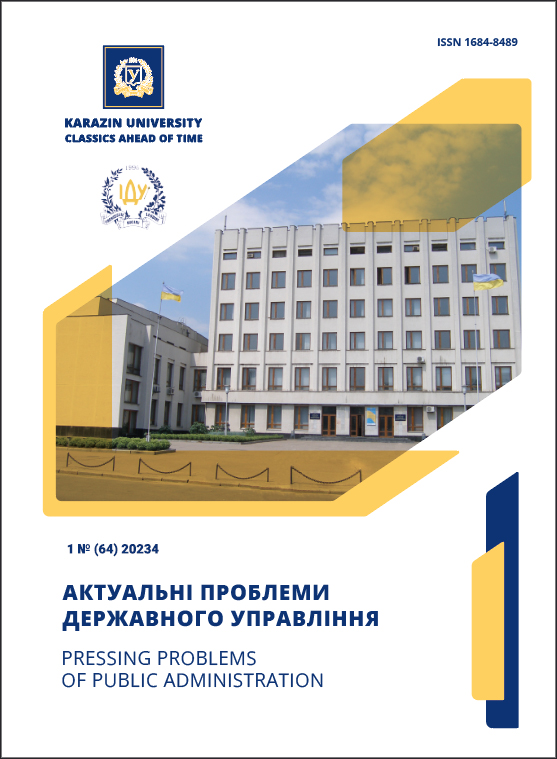Advancement of the Smart City Concept: a Public Management Aspect
Abstract
This paper addresses the conceptual and theoretical aspects of developing a “smart society” through the proliferation of the smart city concept. It examines the intelligent integration of information and communication technologies for monitoring and managing urban infrastructure. The study notes that smart cities encompass data collection and analysis, good governance, consumer efficiency, and environmental sustainability. Both European and American approaches to structuring smart city systems are elucidated. The research establishes that smart city components typically include smart governance, smart living, smart people, smart environment, smart economy, and smart transportation. A brief overview of industrial revolutions is provided.
In the realm of public management, understanding the conceptual foundations of a smart city aligns with a component-based approach, wherein specific smart elements are proposed and implemented. However, this approach does not resolve issues related to coherent, substantive development of the smart city concept in conjunction with human values and humanistic principles. The article emphasizes that from a public management perspective, it is crucial to combine the implementation of the smart city concept with concepts of smart specialization, sustainable development, green transition, and multi-level governance. This integration necessitates the development of coordinated public policy measures, the formation of appropriate public management mechanisms, and the implementation of inclusivity principles.
The study concludes that the substantive content of practical smart city models in formulating public policies and smart city development strategies should be based on an instrumental approach. In this approach, “smart” technologies, “smart” systems, and “smart” ecosystems are viewed and positioned as means to achieve socially important goals. This should be done on the principles of human-centricity, digital and technological humanism, ensuring human freedom and rights, and preserving the essence of humanity.
Downloads
References
Andriyenko, A.O. (2023). Implementation of the “Smart City” concept in the management of large cities in Ukraine: Monograph. Vinnytsia: NGO “European Scientific Platform” [in Ukrainian].
Bobrovskyi, O. (2020). Smart technologization of public administration as a driving force for its development. Aspects of Public Administration, 8(1 SI), 15–17. DOI: https://doi.org/10.15421/152030 [in Ukrainian].
Winners of the “Smart City Awards 2020” competition determined. (n.d.). Association of Ukrainian Cities. Retrieved March 12, 2024. URL: https://www.auc.org.ua/novyna/vyznacheno-peremozhciv-konkursu-smart-city-awards-2020 [in Ukrainian].
Delivery of the future. (n.d.). Forbes.ua. Retrieved March 6, 2024. URL: https://forbes.ua/ru/innovations/dostavka-maybutnogo-yak-samokerovani-roboti-avto-i-droni-zminyuyut-suchasnu-logistiku-14042023-13083 [in Ukrainian].
Delivery of the future: How self-driving robots, cars, and drones are changing modern logistics. (n.d.). Forbes.ua. Retrieved March 6, 2024. URL: https://forbes.ua/innovations/dostavka-maybutnogo-yak-samokerovani-roboti-avto-i-droni-zminyuyut-suchasnu-logistiku-14042023-13083 [in Ukrainian].
Yehorov, I., & Dulska, I. (2021). Smart specialization and the development of information and communication technologies in Ukraine. Smart infrastructure in sustainable city development: Global experience and Ukrainian prospects, 1–400. Kyiv: Razumkov Center, Zapovit Publishing House [in Ukrainian].
Yershova, O.L., & Bazhan, L.I. (2020). Smart city – concept, models, technologies, standardization. Statistics of Ukraine, 2–3, 68–77. DOI: https://doi.org/10.31767/su.2-3(89-90)2020.02-03.08 [in Ukrainian].
Kondratenko, N.O. (2023). Smart city: Theoretical aspects of e-governance implementation. Scientific Innovations and Advanced Technologies, 13 (27), 83–92. DOI: https://doi.org/10.52058/2786-5274-2023-13(27)-83-92 [in Ukrainian].
Korniichenko, A.O. (2022). Activities of public administration entities in the conditions of a smart society. Scientific Notes. Series: Law, 11, 85–90 [in Ukrainian].
Kuznetsova, N.B. (2023). Smart cities and human capital development. Problems of Modern Transformations. Series: Economics and Management, 10. DOI: https://doi.org/10.54929/2786-5738-2023-10-05-01 [in Ukrainian].
Matveyeva, O., & Munkyo, A. (2023). Implementation of the smart city concept in the digital transformation processes of Ukraine for sustainable development. Scientific Bulletin: Public Administration, 1(13), 138–162. DOI: https://doi.org/10.33269/2618-0065-2023-1(13)-138-162
[in Ukrainian].
Panukhnyk, O., & Kurakh, O. (2023). Possibilities of implementing international advanced knowledge and experience in the sustainable development of smart cities and territorial communities of Ukraine. Socio-Economic Problems and the State, 2(29), 111–118. DOI: https://doi.org/10.33108/sepd2023.02.111 [in Ukrainian].
Perely, D.D. (2023). Smart city concept in the context of information society development. Public Administration and Administration in Ukraine, 33, 136–140. DOI: https://doi.org/10.32782/pma2663-5240-2023.33.25 [in Ukrainian].
IT Cluster representatives presented the “Smart City” project to the Mayor of Kharkiv. (n.d.). Retrieved March 6, 2024. URL: https://www.city.kharkiv.ua/uk/news/-54002.html [in Ukrainian].
Radchenko, K.V. (2022). Modern foreign approaches to defining the concept of “smart city”. Economic Management: Theory and Practice: Collection of Scientific Papers, 174–188.
DOI: https://doi.org/10.37405/2221-1187.2022.174-188 [in Ukrainian].
Smart city: Smart city technologies and their purpose. (n.d.). Retrieved March 10, 2024. URL: https://eukraine.org.ua/ua/news/smart-city-tehnologiyi-rozumnogo-mista-ta-yih-cilove-priznachennya [in Ukrainian].
Artyushina, A., & Wernick, A. (2021). Smart city in a post-pandemic world: Small-scale green and over-policed. Retrieved May 23, 2024. URL: https://spacing.ca/toronto/2021/11/08/smart-city-tech-post-pandemic-small-scale-greenover-policed/
Doran, G.T. (1981). There’s a S.M.A.R.T. way to write management’s goals and objectives. Retrieved May 8, 2024. URL: https://community.mis.temple.edu/mis0855002fall2015/files/2015/10/S.M.A.R.T-Way-Management-Review.pdf
Mietule, I., Hushko, S., Maksymova, I., Sheludiakova, N., Kulishov, V., & Lonska, J. (2021). Information and communication technology: Case for tertiary education in terms of smart economics. Society. Integration. Education. Proceedings of the International Scientific Conference, 5, 401–413. DOI: https://doi.org/10.17770/sie2021vol5.6396
Rana, S., Eggers, W. D., & Kelkar, M. (2024). Smart city 2.0: The second wave in smart city transformation. Building the Smart City. Deloitte Center for Government Insights. Retrieved March 18, 2024. URL: https://www2.deloitte.com/content/dam/Deloitte/ua/Documents/public-sector/building-the-smart-city.pdf
Noble, S.M., Mende, M., Grewal, D., & Parasuraman, A. (2022). The Fifth Industrial Revolution: How harmonious human–machine collaboration is triggering a retail and service revolution. Journal of Retailing, 98, 199–208. DOI: https://doi.org/10.1016/j.jretai.2022.04.003
Suprunenko, S., Pylypenko, N., Trubnik, T., & Volchenko, N. (2023). Forecast of changes in the macroeconomic situation in Ukraine: Smart economy of the future. Futurity Economics & Law, 3 (3), 219–236. DOI: https://doi.org/10.57125/FEL.2023.09.25.13
Xu C.K., & Tang T. (2020). Closing the gap or widening the divide: The impacts of technology enabled coproduction on equity in public service delivery. Public administration review, no. 80 (6), 962–975. DOI: https://doi.org/10.1111/puar.13222
Zhang, M., Zhao, P., & Qiao, S. (2020) Smartness-Induced Transport Inequality: Privacy Concern, Lacking Knowledge of Smartphone Use and Unequal Access to Transport Information. Transport Policy, no. 99, 175–185.

